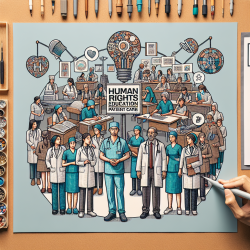Human rights education in patient care is a transformative approach that can significantly enhance the skills and competencies of health professionals. By integrating human rights norms into everyday practices, practitioners can foster a culture of respect, empathy, and advocacy within healthcare settings. The research article "Human rights education in patient care" by Joanna N. Erdman provides valuable insights into the implementation and outcomes of human rights education in the health professions.
Building Knowledge
Human rights education aims to impart essential knowledge about human rights laws and institutions. Health professionals need to understand the legal frameworks that protect patient rights and how these frameworks apply to their practice. Resources such as the Health and Human Rights Resource Guide and the Global Health and Human Rights Database offer accessible content that pairs international treaties with case summaries and key interpretations.
Changing Culture
Enculturating human rights within healthcare institutions involves changing the values, beliefs, and behaviors of health professionals. This objective focuses on exposing and challenging harmful stereotypes and social norms that rationalize mistreatment of marginalized groups. Experiential education methods, such as role-playing and guest engagements, can help practitioners develop empathy and a deeper understanding of their patients' lived experiences.
Empowering Advocacy
Human rights education also seeks to empower health professionals to advocate for social justice. By equipping practitioners with advocacy skills, they can use their knowledge of social determinants of health to promote systemic changes. Initiatives like the Health and Human Rights Programme at the University of Cape Town demonstrate the potential for human rights education to drive meaningful reforms in healthcare delivery.
Conclusion
Integrating human rights education into health professional training can build knowledge, change institutional culture, and empower advocacy. These outcomes contribute to a more just and equitable healthcare system. Practitioners interested in improving their skills and promoting patient rights should consider exploring human rights education further.To read the original research paper, please follow this link:
Human rights education in patient care.
